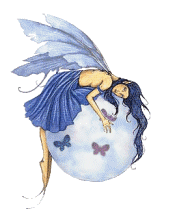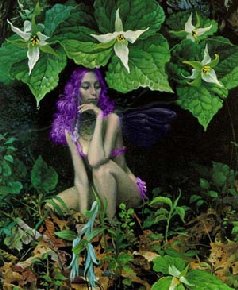|


What is a Faerie?~
"Faerie" is the generic term for all creatures, mistakenly called 'supernatural', who are neither
in God's nor the devil's service. Faries inhabit most countries of the world, but each nation has its particular cultural
group. Irish Leprechauns, Scottish Brownies and German Kobolds are all faeries, all independent of religion and quite natural
in movement, taste and manners.
In Ireland two distinct faerie types exist -
The trooping faeries and the solitary faeries.
The trooping faeries are to be found in merry bands about the hawthorn tree or at feasts in gilded
faerie places. They delight in company, while the solitary faeries avoid large gatherings, preferring to be left by themselves
and separate from one another. The trooping faeries are the major and presiding residents of faerieland; but the solitary
ones have greater interest in mortal affairs and hence are gernerally more familiar to us.
Irish faerieland exists now.
It has always existed alongside mortal borders. And there has always been considerable intercourse between the two realms,
although the traffic has diminished in modern times. But although few mortals have the ability any more to see those of faerieland,
faeries still live in immortal good health and will yet manifest themselves to those sincere of believe and simple and passionate
in nature.
Faery or fairyland is the world in which fairies reside. Some say that the word "faery" means magic,
but that is because, to most mortal eyes, the world seems unreal and lawless. By fairy standards the land of faery and its
ways are natural and orderly. "Faery" is merely a descriptive term with which mortals acknowledge the living land and extension
of immortal beings called fairies.
Fairies exists all over the world. In Persia they are called Peri, in Greece Fata or
Destinies. In Provencal they are Fada, in Spanish Hada. The names all imply fate. In Ireland they are the sídhe (pronounced
shee), a name they have retained from the ancient days when they were recognized as gods. In a group they are the daione sídhe
or fairy people; singly each one is siog (sheogue). Some say they get their name Aes Sídhe (folk of the sídhe hillock or mound)
from the large sídh or mound in which they inhabit; but others claim that the hillocks got their name from the fairies' habitation
of them. The point is still disputed.
Most often the Irish Fairies are called the good people or the gentry. In Greece
mortals called the blood-thirsting Furies the Eumenides or the kindly ones in the hope that they would not destroy their lands
or people. In Ireland the title "the good people" serves the same function, because the fairies, quick to be offended, must
be placated or they might, in a moment of anger, devastate the crops or cause mortal children to sicken and die. What is good
for a fairy may be fatal for a mortal; so we hope by flattering them, they might keep us favourably in mind.
Your Magic Fairy;s name Click here
My Magical Fairies Name
~
 |
My fairy is called Feather Hailfilter |
|
She is a protector of the lonely |
|
She lives in high places where the clouds meet the earth |
|
She is only seen on midsummer's eve |
Fairie Dispositions
|
